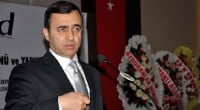Keyword: Defamation of Hizmet

Gülen’s lawyer: Targeting overseas Turkish educators breaks law
Nurullah Albayrak, the legal representative of Turkish Islamic scholar Fethullah Gülen, in a written statement on Wednesday spoke out against a front-page story in the pro-government Star daily that published the photos of 160 educators at Turkish schools overseas that are affiliated with the faith-based Gülen movement, saying the daily is breaking the law and violating those individuals’ human rights by depicting innocent people as criminals.

Terrorism charges against Karaca do not make sense, CHP leader says
The leader of the main opposition party has implied that the recent arrest of Hidayet Karaca, the general manager of the Samanyolu Broadcasting Group (STV), on charges of heading a terrorist organization does not make sense as there is no solid evidence against the suspect.

Why did Turkey seize Bank Asya?
In September 2014, in an address to the Turkish Industry and Business Association, Turkish President Recep Tayyip Erdogan made the following statement: “No effort is underway to cause the bankruptcy of a bank. That bank is already bankrupt. They are carrying water by hand to keep it afloat.”

Illegal raid against Bank Asya spells disaster for Turkey, says TUSKON head
“The raid on Bank Asya is a violation of the right of proprietorship and a murders the entrepreneurial spirit,” noted the president of the Confederation of Businessmen and Industrialists of Turkey (TUSKON), Rızanur Meral, in an interview with Bugün TV.

Award-winning US screenwriter: Without freedom of speech and media, we’re all slaves
Terry Spencer Hesser, director of the first feature-length movie about Fethullah Gülen and the Hizmet movement, a grassroots initiative inspired by the Islamic scholar, spoke to Sunday’s Zaman at the Strasbourg screening of the biopic titled “Love Is a Verb,”

Gov’t’s pressure for closure of Turkish schools abroad yields no result
The movement that started out a quarter-century ago to support education for children abroad starting with the autonomous Azerbaijani republic of Nakhchivan has now reached 160 foreign countries, with the founders of the movement and its volunteers welcomed with open arms around the world.

Erdoğan distorts Gülen’s NYT op-ed, says it is about Bank Asya operation
President Recep Tayyip Erdoğan has presented a distorted interpretation of an op-ed written by Islamic scholar Fethullah Gülen that was published in The New York Times, claiming the op-ed is about the takeover of the board of Islamic lender Bank Asya by Turkey’s banking watchdog.

Bank Asya faithful boost deposits after Turkey seizes lender
Bank Asya has become a battleground in the feud between Turkish President Recep Tayyip Erdogan and self-exiled, U.S.-based cleric Fethullah Gulen, a preacher whom Erdogan blames for instigating a coup attempt against him and whose followers founded the lender. Supporters of each have sought, by turn, to strengthen and weaken the bank.

Dozens of US Congress members urge Kerry to press Turkey for freer media
A large number of members of the US Congress have voiced concerns on the recent arrest of media members in Turkey and called on Secretary of State John Kerry to press the Turkish government to secure press freedom in the country.

Bank Asya seeks immediate return of ‘hijacked’ management rights
Turkey’s largest Islamic lender, Bank Asya, is demanding that the state-run Savings Deposit Insurance Fund (TMSF) return the bank’s rights to control its management following strong indications that the fund’s decision on Tuesday to take over control of the lender’s board has no legal basis and is politically motivated.

Separation politics and Islam makes Gülen AKP’s enemy
“The Gülen Movement is faith inspired in its motivation, but faith neutral in its manifestation.” That is how key speaker Ozcan Keles, chairperson of Dialogue Society in London, characterized the Gülen Movement in a panel discussion on the Hizmet Movement Tuesday in the European Parliament.





















